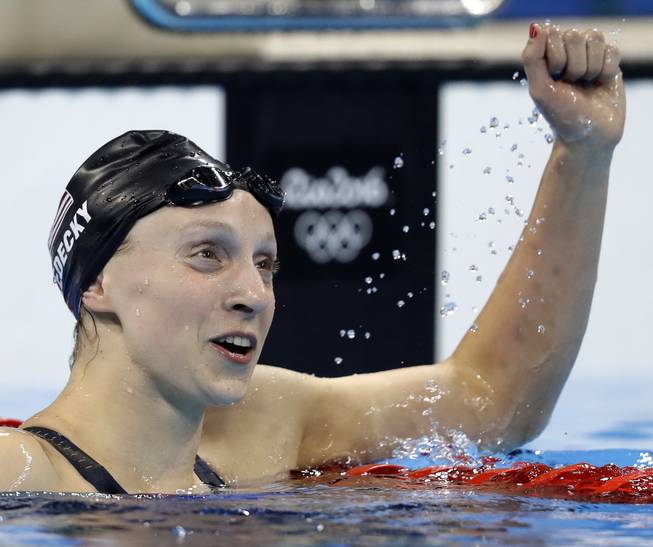
Michael Sohn / AP
United States’ Katie Ledecky celebrates after the women’s 800-meter freestyle final during the swimming competitions at the 2016 Summer Olympics, Friday, Aug. 12, 2016, in Rio de Janeiro, Brazil.
Tuesday, March 2, 2021 | 11:45 p.m.
Like everyone else, Katie Ledecky was forced to shelve her plans when the coronavirus pandemic took hold. Instead of looking far into the future, the five-time Olympic champion swimmer switched to a more immediate mindset.
Forget that the four-year cycle leading to the 2024 Paris Olympics is already underway. Ledecky is still working toward making a big splash at this summer’s delayed Tokyo Games.
“In some ways not traveling over the past year and just being able to train has been really good for me and something I hope will pay dividends,” she said from Northern California in a recent virtual interview. “I’m someone that really loves training. I kind of like the day-to-day of just going to work and putting in that work in the pool and eventually seeing the results.”
Ledecky will take a measure of herself when she returns to national competition on Wednesday for the first time in a year. She’s entered in six events at the TYR Pro Swim Series meet in San Antonio, Texas.
Ledecky is among several big names diving back in with three months to go until the U.S. Olympic trials. Caeleb Dressel, Simone Manuel, double backstroke world-record holder Regan Smith, and Ryan Lochte will swim over four days in the first single-site American meet since the pandemic began.
Aiming to make his fifth Olympic team, Lochte is entered in five events.
Ledecky is entered in her usual events: 200-, 400-, 800- and 1,500-meter freestyles. She’s also set to swim the 50 and 100 free.
Her Olympic schedule will focus on the 200, 400, 800 and 1,500, plus any relays. The 1,500 is a new women’s event in Tokyo.
Last March, when it was announced the Tokyo Olympics were postponed, Ledecky resumed classes at Stanford. She had planned to take the year off from school leading up to the games; instead, she signed up for a full schedule of virtual classes in the spring and fall. She completed her psychology degree with a minor in political science.
“That was a great silver lining,” she said.
In the early days of the pandemic, Ledecky scrambled to find a pool to train in after Stanford shut down its facilities. She and Manuel worked out in a backyard pool.
“The main focus for that period of time was just keeping a feel for the water,” she said. “We relied on each other and kept each other accountable and kept each other focused on our goals.”
Last fall, Stanford and rival California staged small meets that Ledecky swam in. In January, she competed against training partners in a mock meet that included preliminaries and finals to make it resemble a real competition.
“I feel like some of these experiences have built my confidence,” she said. “If I can swim fast in that kind of environment, I can swim fast at a big stage like Olympic trials or the games when maybe we won’t have spectators.”
Ledecky isn't sure what awaits in Tokyo. She wants to know more details on how frequently the athletes will be tested for coronavirus, where they'll be tested, and what the swimming venue will look and feel like.
“Of course, I want everyone to stay healthy,” she said. “I guess that would be my biggest fear, that there’s a huge outbreak at the games. I’m pretty confident in how Tokyo is managing it so far.”
Then there's drug testing.
The U.S. resumed its usual testing procedures last fall. However, in the initial stages of the pandemic's national shutdown, Ledecky joined the U.S. Anti-Doping Agency's Project Believe 2020. It involved high-profile Olympians conducting urine and blood tests in their homes on their own while being observed virtually by USADA personnel.
“I was able to still get tested throughout last year,” she said.
But Ledecky wonders about the rest of the world.
“I do have some concern,” she said. “There's some uncertainty there, in that I haven't really heard how much other countries are testing.”
Ledecky is currently tested for COVID-19 multiple times weekly during training. She practices social distancing and wears a mask — all things she expects to do at a very unusual Olympics.
“Just trying to do as much as I can to prepare for those different things that may happen, the different protocols," she said. "Just trying to learn what that may look like, so that come Tokyo I’m not caught by surprise.”
With her college degree in hand, Ledecky has spent time out of the pool visiting virtually with schools, club teams and children's hospitals. She hasn't seen most of her Maryland-based family since Christmas 2019.
Ledecky turns 24 later this month, putting her in the prime of her career. She doesn't feel cheated by losing precious time to a global pandemic, though.
“I don’t feel like I missed out on some performances,” she said. “I had some good performances last year as we were leading into trials. I feel like I’m carrying that momentum to this year.”
